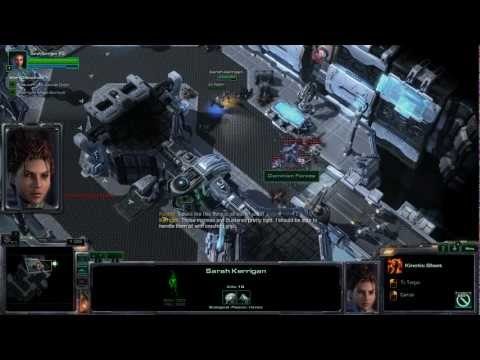Starcraft Heroes – Matt Horner
Matt Horner spent his youth as the second son of a minor trader on Tyrador IX, and from an early age craved a change from his easy and uneventful life. That change was promised by the tales of a passing trader, about a tyrannical empire and brave men and women who wanted to liberate the land.
Planets Starcraft – Mar Sara
Mar Sara was the eighth colony world settled by the former Terran Confederation. Although the planet is rather desolate and remote, its mining industry was once considered a key strategic resource. He was overrun by the Zerg and later cremated by the Protoss. Intrepid Terrans terraformed the planet and recolonized it in 2502.
Starcraft Units – Devil Dogs
The Devil Dogs are an ex-Confederate terran mercenary group, their only concern being who signs their paycheck. They have fought across dozens of worlds. Troop strength: 2 elite fire eaters Vital values: +60% hit points, +25% damage Training location: Mercenary Quarters Limit per mission: squads Cost: 25,000 credits
Starcraft Missions – Evolution of the Hydralisk
Overnight, the apocalypse befalls the Terran colonies: 2 alien races invade the sector, seemingly destroying everything in their path. But the real reason is far more gigantic than first assumed.
Starcraft Buildings – Spiny Crawler
The Spine Crawler is a Zerg static defense structure that deals 25 damage to ground units with a 5 point damage bonus to armored units. Although similar to the Sunken Colony, the Spine Crawler has the distinct ability to Uproot itself and Root in a new location, making it somewhat mobile and more flexible in use.
Follow us and check out our social media accounts on Twitter, Facebook & YouTube ►
● on Twitter ► esport.directory
● Facebook ► esport.directory
● Youtube ► esport.directory
Starcraft
Starcraft is a turn-based game. The active player receives the obligatory first player token, so it should always be clear whose turn is being played, and especially interesting: StarCraft does not require any dice at all.
To get started, you first have to agree on your faction, then gather all the necessary figures, cards and tokens of your faction (woe betide the game master who only starts sorting now!) and leave the table in the middle free, as this is where the galaxy, i.e. the playing field, is built.
This proceeds similarly to Twilight Imperium.
Each player draws two planet tokens, which they can use to pick their planets from the planet stack. This step is necessary because the planet cards are shaped differently and the tokens are the only way to ensure that the drawing is random.
The starting player then places his first planet in the center of the table and can already build a base – but he doesn’t have to, then he has to do it on his second planet as soon as he lays it out.
Once the first planet is in place, it is the next player’s turn to lay out his first planet and connect it to the previous player’s planet with a navigation route cardboard piece. The last player may lay out both planets at the same time and then it goes in reverse order to the starting player. This way a more or less interconnected galaxy is created.
Finally, Z-axes are laid, which are navigation routes across loose ends, sort of a 3D conversion.
Each player receives the corresponding resource cards for his two planets and then only the event cards are reduced according to the number of players, shuffled and placed on the board. There are three event card phases, which is symbolized by different card backs and should help the game to become faster and more powerful towards the end. Now the game can start.
Each round is divided into three phases.
Starcraft is a turn-based game. The active player gets the obligatory first player token, so it should always be clear whose turn is being played, and most interestingly, StarCraft doesn’t require any dice at all.
To get started, you first have to agree on your faction, then gather all the necessary figures, cards and tokens of your faction (woe betide the game master who only starts sorting now!) and leave the table in the middle free, as this is where the galaxy, i.e. the playing field, is built.
This proceeds similarly to Twilight Imperium.
Each player draws two planet tokens, which they can use to pick their planets from the planet stack. This step is necessary because the planet cards are shaped differently and the tokens are the only way to ensure that the drawing is random.
The starting player then places his first planet in the center of the table and can already build a base – but he doesn’t have to, then he has to do it on his second planet as soon as he lays it out.
Once the first planet is in place, it is the next player’s turn to lay out his first planet and connect it to the previous player’s planet with a navigation route cardboard piece. The last player may lay out both planets at the same time and then it goes in reverse order to the starting player. This way a more or less interconnected galaxy is created.
Finally, Z-axes are laid, which are navigation routes across loose ends, sort of a 3D conversion.
Starcraft Gameplay, Starcraft Rankings, Starcraft Release Date, Starcraft Carrier, ‚ Starcraft Cover, Starcraft Skins, Starcraft Videos, Starcraft Video YouTube, Starcraft PS4, Starcraft Platforms, Starcraft Players, Starcraft Team,




